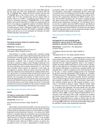 April 2019 in “Journal of Investigative Dermatology”
April 2019 in “Journal of Investigative Dermatology” Non-coding RNA boosts retinoic acid production and signaling, aiding regeneration.
[object Object]  April 2019 in “Journal of Investigative Dermatology”
April 2019 in “Journal of Investigative Dermatology” Eating grape powder may reduce the severity of skin allergy symptoms.
 August 2018 in “Online journal of neurology and brain disorders”
August 2018 in “Online journal of neurology and brain disorders” Sodium valproate is effective in treating epilepsy, especially in patients who don't respond to other medications.
 October 2017 in “Journal of Investigative Dermatology Symposium Proceedings”
October 2017 in “Journal of Investigative Dermatology Symposium Proceedings” Using lidocaine before keloid injections makes the treatment more comfortable for patients.
 June 2017 in “Experimental and Therapeutic Medicine”
June 2017 in “Experimental and Therapeutic Medicine” The anti-CXCL4 antibody helps mice grow hair faster and prevents hair loss.
 January 2016 in “Springer eBooks”
January 2016 in “Springer eBooks” Understanding drug interactions, side effects, and patient-specific factors is crucial for effective dermatological care.
 July 2012 in “The Journal of Urology”
July 2012 in “The Journal of Urology” Testosterone increases muscle mass regardless of DHT conversion blocking.
 May 2012 in “Scientific American”
May 2012 in “Scientific American” New app improves storm surge predictions; advances in baldness treatment show potential but require time.
 May 2012 in “Scientific American”
May 2012 in “Scientific American” Blocking a compound called prostaglandin D₂ might help treat hair loss.

The vitamin D receptor has many roles in the body beyond managing calcium, affecting the immune system, hair growth, muscles, fat, bone marrow, and cancer cells.
 1533 citations,
October 2008 in “Endocrine reviews”
1533 citations,
October 2008 in “Endocrine reviews” Mice without the vitamin D receptor have bone issues and other health problems, suggesting vitamin D is important for preventing various diseases in humans.
 1039 citations,
February 2009 in “Nature Reviews Molecular Cell Biology”
1039 citations,
February 2009 in “Nature Reviews Molecular Cell Biology” Skin stem cells are crucial for maintaining and repairing the skin and hair, using a complex mix of signals to do so.
 829 citations,
May 2007 in “Nature”
829 citations,
May 2007 in “Nature” Hair follicles can regrow in wounded adult mouse skin using a process like embryo development.
 658 citations,
June 2003 in “Endocrine reviews”
658 citations,
June 2003 in “Endocrine reviews” Male hormones may play a role in the development of heart disease, and more research is needed to understand their effects.
 551 citations,
November 2013 in “Nature”
551 citations,
November 2013 in “Nature” Certain mature cells in mouse lungs can turn back into stem cells to aid in tissue repair.
 520 citations,
January 2017 in “AIMS biophysics”
520 citations,
January 2017 in “AIMS biophysics” Photobiomodulation therapy using red and near-infrared light can reduce inflammation and aid in healing various conditions.
[object Object]  506 citations,
January 2012 in “Molecular and Cellular Endocrinology”
506 citations,
January 2012 in “Molecular and Cellular Endocrinology” Melatonin affects many body functions beyond sleep by interacting with specific receptors in various tissues.
 499 citations,
September 2011 in “Cell”
499 citations,
September 2011 in “Cell” Fat-related cells are important for initiating hair growth.
 479 citations,
January 2005 in “BioEssays”
479 citations,
January 2005 in “BioEssays” Hair follicle development is controlled by interactions between skin tissues and specific molecular signals.
 474 citations,
January 2012 in “Chemistry & biology”
474 citations,
January 2012 in “Chemistry & biology” Proteasome inhibitors are promising treatments for various cancers, autoimmune diseases, and other conditions.
 403 citations,
November 2005 in “Journal of Endocrinology”
403 citations,
November 2005 in “Journal of Endocrinology” Dehydroepiandrosterone (DHEA) is a prohormone important for producing sex steroids and has potential health benefits.
 397 citations,
February 2004 in “British Journal of Dermatology”
397 citations,
February 2004 in “British Journal of Dermatology” Minoxidil boosts hair growth by opening potassium channels and increasing cell activity.
 391 citations,
January 2010 in “Journal of The American Academy of Dermatology”
391 citations,
January 2010 in “Journal of The American Academy of Dermatology” Half of people with Alopecia Areata may see hair regrowth within a year without treatment, but recovery is unpredictable.
 375 citations,
July 2006 in “Journal of Investigative Dermatology”
375 citations,
July 2006 in “Journal of Investigative Dermatology” Stress can worsen skin and hair conditions by affecting the skin's immune response and hormone levels.
 356 citations,
March 2012 in “Trends in Plant Science”
356 citations,
March 2012 in “Trends in Plant Science” Auxin and ethylene hormones both work together and against each other to control plant growth.
 351 citations,
February 2010 in “Nature Cell Biology”
351 citations,
February 2010 in “Nature Cell Biology” Basal cell carcinoma mostly starts from cells in the upper skin layers, not hair follicle stem cells.
 341 citations,
November 2009 in “The FASEB Journal”
341 citations,
November 2009 in “The FASEB Journal” Calreticulin has roles in healing, immune response, and disease beyond its known functions in the endoplasmic reticulum.
 321 citations,
March 2015 in “Nature”
321 citations,
March 2015 in “Nature” Super-enhancers controlled by pioneer factors like SOX9 are crucial for stem cell adaptability and identity.
 314 citations,
April 2010 in “Developmental Cell”
314 citations,
April 2010 in “Developmental Cell” β-catenin in the dermal papilla is crucial for normal hair growth and repair.
 301 citations,
February 2019 in “Nature Communications”
301 citations,
February 2019 in “Nature Communications” The research found that different types of fibroblasts are involved in wound healing and that some blood cells can turn into fat cells during this process.






























